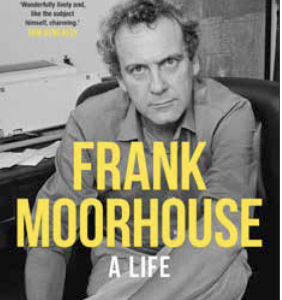Frank Moorhouse: A Life
by Catherine Lumby
Frank Moorhouse, the celebrated Australian author, essayist, screenwriter and journalist, died in 2022, aged 83.
There are now two recent biographies of Moorhouse. He asked his friend, journalist Catherine Lumby, to be his biographer. She spent many hours interviewing Moorhouse and was granted total access to all 158 boxes of archival material. It seems Moorhouse kept everything – a great gift to any biographer. Lumby had finished all but the conclusion before Moorhouse died and she had his approval. Lumby focuses her biography on the connection between Moorhouse’s life and his work.
His early novels are credited with inventing the new literary form of the discontinuous narrative. They paralleled his life in bohemian Balmain through the late sixties and seventies as part of but, in Moorhouse fashion, not in total agreement with the avant-garde group known as The Push. Moorhouse was heavily invested, to the point of arrest, in gay rights, First Nation rights, feminism, censorship and copyright laws for writers. His efforts and activism were partly responsible for changes to both copyright law and the lessening of censorship restrictions.
Moorhouse was a bisexual cross-dresser at a time when homosexuality was a crime. He had long affairs with both men and women. The women in Moorhouse’s life are named with their permission. All are well known strong successful woman in the arts and academia. The male lovers are not named, as requested. Interesting?
Moorhouse had a total aversion to domesticity in any form. He preferred to live alone, write in comfortable female clothing, eat excellent food in excellent restaurants and drink martinis. He seems to have managed this while often without money.
Moorhouse’s greatest achievement is his United Nation Trilogy, where he created Edith Campbell Berry, one of the best, most complex and fascinating characters in Australian fiction. The three novels Grand Days, Dark Places and Cold Light tell of Edith’s life from Europe to her return to Australia. Lumby makes a lot of connections between Frank and Edith. When I read these novels I had thought Edith was indeed Moorhouse and now I’m more convinced.
This is a fascinating biography of a great Australian writer and his time.
